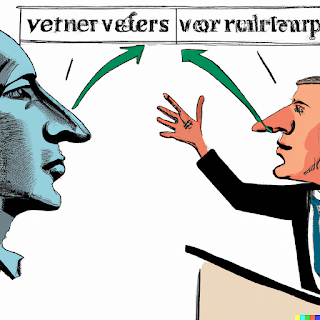The rise of populist politicians, frequently distinguished by their anti-establishment rhetoric and strong nationalist tendencies, has been observed around the world in recent years. Because of their captivating personalities, these leaders have attracted a following of devoted followers who frequently fail to consider the effects of their decisions. Researchers are now interested in studying the psychology of political employees who have a strong emotional attachment to their leaders, even when doing so means defying logic and possibly suffering unpleasant consequences.
An unusual pattern emerges from a linguistic analysis of the vocabulary used by these political activists to express their feelings toward their leaders. They use analogies, emotive language, and persuasion techniques in political speeches to encourage allegiance and emotional commitment. When used in concert with other cognitive and psychological processes, language is frequently a potent weapon for influencing the listeners' emotions.
Read more: populist movements and leaders and their political supporters
This article will concentrate on some of the most well-known populist leaders' supporters and followers. Populist movements and leaders have been linked to populist traits all over the world. Prominent leaders include Rodrigo Duterte, Viktor Orbán, Andrés Manuel López Obrador, Marine Le Pen, Narendra Modi, Matteo Salvini, Jair Bolsonaro, and Recep Tayyip Erdogan.
The employment of metaphors is one of the most important language characteristics of populist speeches. Metaphors are frequently used to connect a specific issue or topic to a larger theme or notion that appeals to the emotions of the audience. For instance, Donald Trump's slogan "Make America Great Again" serves as a metaphor for his desire to bring the nation back to its former splendor. The analogous description of the Brazilian flag by Jair Bolsonaro as the "sacred symbol of our nationality" appeals to the audience's sense of patriotism. By establishing an emotional connection between the audience and the leader's vision, these metaphors help to generate a sense of community and purpose.
A key weapon in the arsenal of populist politicians and their supporters is emotive language. The use of words and phrases that arouse emotions in the audience, such as fear, rage, or excitement, is known as emotive language. Populist leaders frequently present themselves as the only solution to the nation's problems by using emotive language to evoke a sense of urgency and danger. For instance, Rodrigo Duterte's warning that drug traffickers must be removed because they are ruining the nation does it in a way that inspires dread and urgency, giving his fans the impression that he is the only person who can address the issue.
Political speeches frequently employ persuasive techniques in addition to metaphors and emotive language to encourage allegiance and emotional commitment. Techniques used to persuade an audience, such as repetition, social proof, and the use of authorities, are known as persuasion strategies. Repetition is a common technique used by populist leaders and their supporters to strengthen their points and make their points memorable to the audience. For instance, Narendra Modi frequently emphasizes his commitment to inclusive development by using the phrase "Sabka Saath, Sabka Vikas" (Together with All, Development for All).
Read more: Imran Khan alleges a plot to imprison him and Finish PTI
An intriguing and complex issue, in conclusion, is the language perspective on the psychology of political workers who exhibit a strong emotional commitment to their leaders. Language is a potent instrument that populist leaders and their supporters employ to encourage allegiance and emotional commitment. Political speeches that include metaphors, emotive language, and persuasion techniques make it simpler for followers to ignore the effects of their policies and actions by establishing an emotional connection between the audience and the leader's goal. Understanding the psychology of populist leaders' supporters and how language influences emotional commitment is essential as populist leaders continue to gain popularity around the world.




